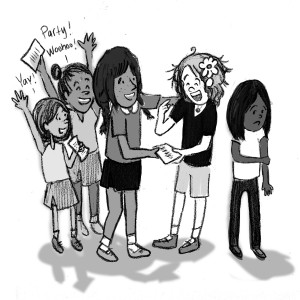|
|
October 17, 2013
 Just shut up. No, YOU shut up! So the US government shut-down is over and the default crisis has been diverted with seconds to spare. Cool cool cool.
This isn’t a political post so no worries. Today, I’m neutral. Really. I don’t care which side of the river you pitch your tent. I only care about teaching kids to be good people, and that includes treating other people with respect. We all remember respect, right? The fine art of listening with an open heart and mind even when you don’t agree with what the other guy is saying. Even when listening to him or her makes your head explode.
What we all witnessed going down on Capitol Hill these past few weeks provides a great opportunity to talk to kids about compromise. When the kids in your life engage in a dispute on the playing field or a heated discussion in the classroom, what do they do? How do they typically behave when they’re locked in a disagreement with you or siblings or friends?
The slog has cleared in Washington and it’s a great time to have conversations, at home and at school, about getting along with other people. First you might start by asking yourself two simple questions:
- “How well do my kids perform when it comes to calming down and putting in the time and effort to understand the other guy’s or girl’s point of view?
- “In what ways could I do a better job helping my kids work together to move respectfully through a conflict to a compromise that serves the greater good (of the family, the team, the class)?”
Now that you’ve got something to think about, take the concepts out of your head and bring them into the real world of kids and the challenge of getting along with people. Talk to your children about resolving conflicts (online and off). Find out which of their approaches work well and which ones not so much. Make sure the discussion remains open and safe with all opinions respectfully listened to.
Oh, and don’t forget to model what you teach. For example, when your kids disagree with you and dig in their heels, how do you typically respond?
As always, your comments are valued and respected.
Check out Day 18 of the Kindness and Respect Challenge

October 10, 2013
In case you missed yesterday’s episode, you might want to take a minute to read the email from the teen whose friendship with her bff made her feel like a prisoner “in jail.” She wanted out, but didn’t know how to find the exit. I advised her to talk to her friend and take a vacation from the friendship.
Here’s what happened next:
Hey Terra,
Thank you very much! I’ve already told her today but things got all crazy. I said that I don’t want to be her best friend anymore, just want to be an ordinary friend to her. But I think she got it all wrong. Guess what she did?? She bad-mouthed me to my other friends!! She created bad stories about me! None of it was true! I hate her and exams are next week but my head just can’t focus!! Help!
Now What?!
Dear Now What,
I’m not surprised she turned against you. She hasn’t been acting like a real friend for a while. This is just more of the same… with the volume cranked up. If your other friends believe the lies she made up and turn against you too, they’re not acting like real friends either. You deserve so much better.
I understand this is hard. We all want to be liked. We want people to say only good things and think only good thoughts about us. But no one has the remote controller for anyone else’s mouth or brain. People say what they want to say and think what they want to think. People also believe exactly what they choose to believe. You’ve got no control over any of it. Zero. But…you can choose not to let this upset you so much. Your ex-bff and the other girls have no power over you unless you give away your power to them.
You need to relax so you can study for your exams… and do your best. Every time you catch yourself thinking about the social garbage these girls are creating and spreading around, STOP… and take some slow deep breaths. Here’s how:
Inhale slowly and evenly through your nose (Try it right now)….
Then relax your jaw, open your mouth and slowly and evenly exhale.
(Go ahead.)
Repeat the cycle.
Inhale (and think “I am breathing IN….”)
Exhale (and think “I am breathing OUT…”
Close your eyes and continue breathing, slowly and mindfully.
IN
OUT
DEEP
SLOW
CALM
EASE
SMILE (Go ahead. Even a half smile will do)
RELEASE
PRESENT MOMENT
WONDERFUL MOMENT
From now on, whenever you catch yourself getting sucked back into this silly drama or the next one, stop and breathe. Re-center. Be kind to yourself. Be respectful of your power for good. Be here.
I hope this helps. Good luck with your exams.
In friendship,
Terra
A few days later I heard back from her one more time:
Thanks a bunch! (= it really helps.
Ahhhh!
 Namaste See Day 11.

September 27, 2013
I originally wrote a version of this article for TakePart.com
When it comes to teaching kids to be good people, we parents repeat ourselves… a lot. That’s OK, because young skulls are thick and young minds are often distracted. We continue harping on the rules because we want our kids to act responsibly, even when we’re not around. That’s why it’s so gratifying to hear a good report about our kids from teachers or from other parents. At those times, all a proud mom or dad should do is smile graciously and reply, “That’s so nice to hear.” But what do you do with a negative report from school? That’s what this parent wanted to know:
I just received a dreaded phone call from my nine-year-old’s teacher saying that he is goofing off during class time and not staying focused. How can I show him there are consequences for him acting that way in school?
 I didn't do anything!
Use these tips to discuss out-of-line behavior with your child so s/he gets a clear message yet still feels loved and supported:
1. Get the facts. Before talking with your child, talk with the teacher. Find out exactly what’s going on and how it has been handled so far. Find out if other students are involved. The more information you have for your upcoming discussion with your child, the better.
More: How to Help Your Kids Deal With Peer Conflicts at School
2. Talk with your co-parent. If there are two parents in your child’s life, teaching him or her to do the right thing should involve both of them. Whether you are co-parenting under the same roof or not, getting both parents on the same page adds twice the reinforcement for the course correction your child needs. Being on different pages (or in different books!) sends mixed messages. Suppose one parent says, “Emma, when you’re in class your job is to be the good student I know you can be. That means showing your teacher respect by paying attention.” And the other parent chuckles and says, “Fooling around in class? That’s my girl! I gave my teachers a hard time, too.” Obviously, no responsible parent would ever say that, but you get the idea why staying on message is so important.
3. Talk with your child. Call a family meeting and bring snacks. (Always appreciated) Present the information you have. Stay calm as you ask, “What’s true about your behavior in class?” Your child will likely deny the teacher’s report, to which you might reply, “If it’s not accurate, why do you think s/he said it?” You might hear, “The teacher hates me.” Or “I dunno.” Don’t buy it but don’t lose your cool. Simply put on your Good Cop hate and dig deeper. After some more gentle encouragement in the direction of the truth, your child may walk back the denial. “I might have been fooling around a little, but I wasn’t the only one.” Or, “I’d pay more attention if Mr. __ wasn’t so boring!” These are justifications for bad behavior. Acknowledge them calmly, but don’t invest any money. Simply repeat the question, “What’s true about your behavior in class?” At this point, your child may confess, “I guess sometimes I talk while the teacher is talking.” Now we’re getting somewhere!
4. Help your child take responsibility. We control our own behavior. Sure, other people may influence our choices, but ultimately our decisions (to act out in class, to blow off a homework assignment, to spread a nasty rumor, etc.) are our own. Teach your children well. This one’s an important life lesson.
5. Move forward. Work with your child to create some new strategies for being a more attentive student. That includes new ways to respond to distractions in class, when the focus ought to be on the teacher, or at home, when the focus ought to be on homework.
6. Follow up. Work together to set realistic short-term goals and hold your child accountable. If s/he has been failing to turn in daily homework, set up a goal for the next one to two weeks that all homework will be completed (to the best of his/her ability) and turned in on time. Let your child share his/her progress with you. Acknowledge progress! If you need to, stay on top of things (without hovering).
In all of this, your long-term parenting objective is helping your child understand that negative feedback can provide a valuable opportunity to make positive changes in school and in life.

September 26, 2013
Got an email from Concerned Mom whose smart, funny daughter has no trouble making friends, but lots of trouble keeping them. The pattern is this: Daughter gets close to other girls and feels accepted by them. Then, within weeks new found friends exclude and then ignore the girl. Naturally, she feels upset and alone, which, of course breaks Mom’s heart. She turned to me for advice and here’s what I told her:
I understand that it breaks your heart to see your daughter so unhappy. Of course you want her to make real friends who treat her with affection, kindness and respect. But it feels like something is missing in your email.
Each time your daughter is disappointed by a new friend you’ve listened to her side of the story, sympathized and offered comfort and support. All good! But there are at least two sides to every relationship story. That’s why I am curious about what’s going on from the other girls’ perspectives. Maybe you’re also wondering why each of these new friends turn against your daughter after such a short time? It’s a mystery worth exploring.
What might your daughter be doing (knowingly or unknowingly) to contribute to this reaction she often gets? How about if you ask her: “Why do you think ____ stopped wanting to be your friend?”
This question may bring up a lot of emotion, so please ask it in a neutral tone of voice. You’re not accusing your daughter of anything! You’re simply inviting her to put aside her sadness and think about what may be going on here. Right now, she’s hurt and confused and probably feeling powerless. She can regain some of her power by understanding how she functions in friendships because she plays a significant role in every one of them, whether she’s aware of it yet or not. To encourage her to think about that role you need to ask thoughtful, open-ended questions that have no “right” or “wrong” answers. Questions like “Why do you think this girl stopped being your friend?”
Listen to your daughter with an open heart and mind. Try not to interrupt. Initially, she may not say much. She might just shrug and say, “I don’t know.” In which case you might nod understandingly and say, “It’s hard to know why other people do what they do. But we usually have a reason. Your friends have been rude to you. If you could just guess why, what would you guess?”
Your daughter may have fallen into the habit of thinking of herself as a powerless victim to whom other people do unkind things. That’s not a good mental place for her to be. We want our girls to understand emotions (their own and other people’s). We also want them to feel confident in their ability to make and keep real friends. That includes learning to rebound from set-backs and to negotiate the ups and downs of relationships.
I hope this helps.
In friendship,
Annie
*Illustration by Erica De Chavez, from my upcoming The Girls Q&A Book on Friendship
UPDATE October 3, 2014: The Girls Q&A Book on Friendship: 50 Ways to Fix a Friendship Without the DRAMA is now available in print and on Kindle (the ebook can be read on any device, your mobile phone, tablet, or computer with the free Kindle reader app). Visit GirlsQandA.com for an excerpt, reviews, and to order your copy.
 — Older Posts »
| |















